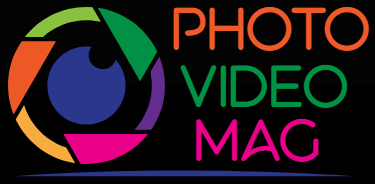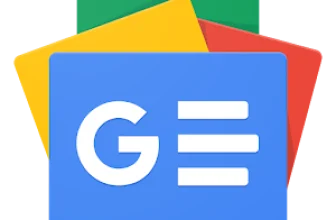9 Popular Types of Social Media Content
GoogleAds

Content is at the heart of every social strategy. It’s how brands make their first and long-lasting impressions on social media. And it’s with content that brands communicate and connect with new and loyal customers alike.
That’s why it’s important to know what to post on each social media platform. So in this article, we’ll share the nine most valuable types of social media content according to marketers and how brands are using these formats to strike a chord with audiences.
The most engaging types of social media content in 2023
Keeping up with the latest in social media is a difficult task with all the different platforms, features and algorithms. That’s why we created The 2023 Content Benchmarks Report to help you identify the most valuable types of social media content.
In this report, we collected data from 729,000 public social profiles in 2022. Then, we analyzed trends to derive what types of social media content will inspire your audience and make them more likely to engage with your brand. Let’s take a look at which formats are most engaging.

1. Short-form video
Short-form videos are the most captivating type of social media content thanks to their capacity to break down and present information in less than one minute. Plus, the length makes it more shareable and ideal for social media.
You’re facing an audience that’s busier than ever. People are looking for immediate gratification with fast and entertaining content they can consume on the way. So a 15-minute video seems impractical when a one-minute video can do the job just as well.
Why short-form video works on social
About 66% of consumers find short-form videos the most engaging out of any other social media post types. And before you say it’s because bigger brands have the resources to produce high-end videos, the truth is successful videos don’t require unlimited time, resources or heavy editing.
According to our research, consumers find short-form videos 2.5x more engaging than long-form videos. So humor and relatability are enough to draw people to your brand. In fact, The 2023 Sprout Social Index™ found that consumers don’t see enough authentic, non-promotional content from brands.
Additionally, short-form videos are perfect for different types of social media post ideas. From highlighting how to use your product or service to influencer collaborations and behind-the-scenes content.
Best social media platforms for short-form video
The popularity of TikTok videos, Instagram Reels and YouTube Shorts is evidence of their effectiveness when it comes to short-form video.
Both TikTok and Instagram have a variety of tools that help create short-form videos for free. You can record a few shots, add a soundtrack, use a filter and follow popular social media trends. Additionally, you can promote your content with native ad campaigns.
Even though YouTube Shorts are a recent feature from YouTube, they have become increasingly popular with 15 billion global daily views.
4 use cases of short-form video from Last Crumb
Last Crumb is a small business born in LA that bakes luxury handmade cookies. This brand stands out for using sassy language and an almost seductive tone to reach its audience.
Last Crumb uses short-form videos on TikTok and Instagram to encourage their audience to crave their cookies with:
Content relating their cookies to popular holiday celebrations. Last Crumb uses their holiday-themed videos to hop on relevant trends and conversations, prompting their audience to share their content with friends and allowing the brand to reach a wider audience.
Influencer collaborations to taste-test their cookies. In these videos, influencers unbox the luxury package and eat the cookies. This tactic leverages influencers’ loyal followings to generate interest within an untapped audience with “reviews” people trust.
Last Crumb’s destruction collection, in which the brand destroys their extravagant cookies, merge “demos” with entertaining content to show the delicious texture of the cookies to keep people watching and drive engagement.
Last Crumb’s sandwich collection shows how you can make different luxury ice cream sandwiches with their cookies. This helps them stay connected with their customers by sharing recipes they might want to try the next time they order cookies.
2. Images
Images are the second most valuable type of content out of the nine popular social media content categories. They’re also one of the types of social media most frequently posted across social networks.
Static images are absorbed and appreciated in an instant. The colors, composition, text (or lack of it) and other details give social users an immediate impression of your brand.
Why images work on social
Amongst the types of social media content, 61% of consumers find images the most engaging type of in-feed social content. I don’t know about you, but I’d rather look at a picture than read a thousand words.
Since mobile devices are equipped with high-definition cameras, and there are many free editing tools, anyone can embrace their inner photographer and graphic designer. This means social media marketers can create images for their content strategy without enlisting a ton of resources.
Best social media platforms for images
Instagram and Pinterest are platforms that naturally lend themselves to images. These social media platforms have unique advantages to leverage your visuals like filters, effects and editing.
Instagram started as an image-sharing platform and even though it has evolved to be much more, its content is still made of 87% images.
When consumers go to Pinterest, they’re looking for inspiration and creativity. In fact, 97% of all searches on the platform are unbranded, creating the perfect environment for audiences to discover your brand and spark their interest in a future purchase.
As a bonus, both platforms have social commerce features that allow you to tag products, transforming images into “shoppable” content.
3 use cases for image posts from Williams Sonoma
Williams Sonoma is known for its kitchenware, home furnishing and gourmet foods. It maintains a strong following, clear reputable brand identity and “shoppable” feeds across social platforms. They achieve that with sumptuous, vibrant images in the following ways:
Williams Sonoma uses top Pinterest trends to create Pins and carousels with colorful dishes and recipes. These images catch the eye of their target audience, enticing clicks to learn more about how to make the dish, which drives engagement and traffic to their website.
They support the full shopping experience on Instagram using eye-candy imagery and product tags. Thanks to these, consumers can get the product they like with a few taps, reducing friction to the final purchase.
Across platforms, they leverage their organic presence by using captions to enhance their image content and CTAs to their blog or online store to continue the buying journey.
3. Live video
The ongoing digital transformation has left businesses thinking differently about how they can engage with customers in real time. In 2020, Live video came out as a winner during the pandemic with live video viewers reaching 152.5 million (20.4% more than in 2019).
Why live video works on social
37% of consumers find live video the most engaging type of social media content. It enables businesses and creators to broadcast conversations, webinars, Q&As or other virtual events. And unlike text or image posts, where you wait for an interaction, live videos give audiences a chance to react in real time.
Live and simultaneous viewing also gives people a sense of community and togetherness. What’s even better is you can repurpose your livestream video to get more value from the content. For example, you could create multiple shorts or text snippets from your livestream for posts on other networks.
Best social media platforms for live video
Many platforms have livestream capabilities, but the best ones are Facebook Live, Instagram Live, YouTube Live and LinkedIn Live.
YouTube, Facebook and LinkedIn Live experienced a boom during the pandemic. YouTube and Facebook Live acted as entertainment for people. While LinkedIn Live allowed brands to reach and communicate with a professional network. On average, LinkedIn live videos get 7x more reactions than native videos.
According to Statista, 43% of US social media users aged 18-34 watched Instagram Live in 2021. That’s in part because the platform is designed to better your chances of followers joining you. When you go live on Instagram, your Live content appears at the beginning of Instagram stories.
How BuzzFeed uses live video to spark interest
BuzzFeed is a news and entertainment company that talks about viral topics. One of its branches, BuzzFeed Video, produces original video content about their articles.
From trying viral TikTok products to, home decor andor easy meal preps, BuzzFeed Video attracts a wide audience around pop culture. They use Facebook Live to bring their blog content to life and be part of the conversation on social. Jumping on viral trends or speaking directly to their audience’s interests enables them to stay relevant in real time and be an entertaining source of information that makes you want to come back for more.
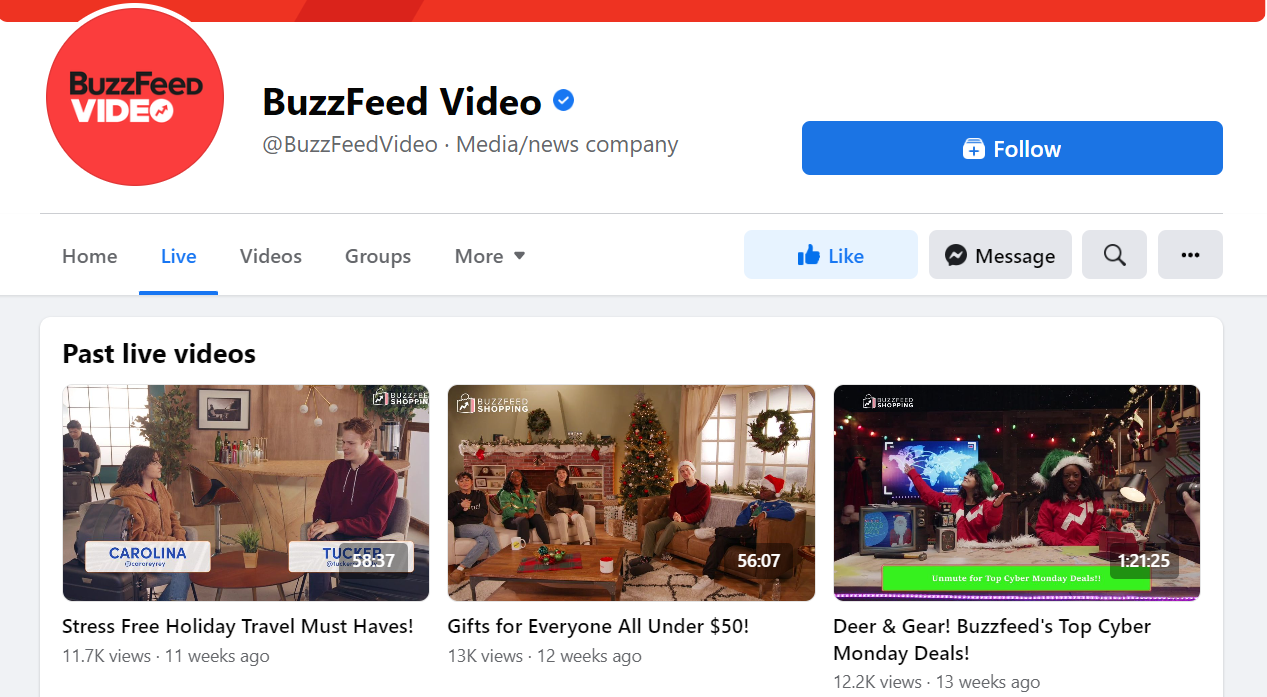
4. GIFs/memes
GIFS and memes are a particular type of social media content favored by younger generations. When words can’t describe the mix of gestures and feelings we all relate to at some point, memes can add meaning to these situations.
These types of social media content assure your audience gets the message and helps your brand relate to your audience through comedic takes on daily life.
Why GIFs and memes work on social
Besides the fact that they’re shareable and enjoyable, their relatability makes it almost personalized content. Something that 71% of consumers expect companies to deliver.
When people see personalized content, their immediate response may be to interact with it and share it with friends. That’s how memes become viral if they’re used with the right audience.
GIFs can have the same effect but are more dynamic due to their animated feature. This makes them an excellent way to start conversations with more than words and still leave an impression.
Best social media platforms for GIFs and memes
Instagram, Facebook, LinkedIn and Twitter are ideal to post memes. But for GIFs, we recommend Facebook, LinkedIn and Twitter. If you post a GIF on Instagram, it will be added as a short video.
Memes drive engagement, that’s why Instagram users share over one million memes daily. They also drive traffic, as proved by a study from Social Media Today. They posted memes on Facebook, Twitter and LinkedIn for a month, which increased their website traffic by 12%.
In the case of GIFs, Facebook, Twitter and LinkedIn have special features for sharing this type of content. Twitter and LinkedIn make it as easy as tapping on the “GIF” icon and selecting the GIF you want to share. And Facebook’s boomerang feature allows you to capture moments in a loop so you can create your own GIFs.
How ProWritingAid uses GIFs/memes to connect with their audience
ProWritingAid is an AI writing assistant software that corrects your grammar and style with automated suggestions. If you go to their Instagram profile, you’ll notice that their most engaging posts are memes from writers for writers.
They use memes to convey their audience’s common tasks, like finishing a book outline, the struggles that come with it and wholesome messages. This relatable content builds relationships with their audience by speaking to their pain points, while still providing comedic relief.

5. Text-based posts
It’s important for businesses to prioritize visual content, but they shouldn’t lose sight of the power of words. What’s more, 32% of consumers say text-based posts are still one of the most engaging types of social media content.
Written content needs the same attention, consistency and creative elements that you give other content formats. But developing a distinctive brand tone and voice that aligns with your visual identity will help your written content stand out from the crowded social chatter.
Why text-based posts work on social
According to our index, 34% of consumers follow their favorite brands on social to see the brand’s personality. And the most direct way to give that to your customers is with text posts.
Short-form video is reigning and an image is worth a thousand words. But that doesn’t mean text-based content is redundant. And that’s especially true for social media, where text-based content can be valuable for starting conversations that help you get to know your customers better.
Best social media platforms for text-based posts
Reddit, Twitter and LinkedIn are top-of-mind for text-based posts in the social media content categories.
Reddit is a great platform to engage in Q&As and get conversational with your fans. While LinkedIn is perfect to share thought leadership, articles and engage with your professional network.
Still, Twitter is by far the most popular platform for text-based posts. It’s perfect to share digestible bits of information, ideas and news. That’s why it’s always buzzing with conversations. And engaging in conversations that interest your audience can help you widen your reach and build a community.
4 use cases of text-based content from McDonald’s
McDonald’s is one of the most successful fast-food chains with millions of customers served each day. On Twitter, the brand uses text posts to communicate with fans in a relatable, casual and humorous voice that brings the brand down to earth. Specifically, they use these types of text posts to define their brand values and start conversations:
Asking their fans questions and encouraging them to engage in fun trends.
Using Tweets to collect and act on the feedback shared directly from their community.
They don’t just post, wait for engagement and leave it at that. The brand addresses nearly every response they get.
McDonald’s cross-promotes their text tweets and repurposes them on other social platforms using graphic elements.
These examples show how McDonald’s uses text-based content as a way of building a community and engaging with them. Plus, this makes customers perceive the brand as approachable which builds trust.
6. User-generated content
User-generated content (UGC) is content created by fans, consumers or users that brands repurpose for their feed. When consumers create content showcasing your products, they’re essentially giving you social proof and testimonials.
UGC has opened the doors for brands to reach a wider audience as people enjoy being part of a community. Also, UGC shows real-life uses of your products or services, which makes your followers more willing to try them.
Why user-generated content works on social
Of all the types of social media content, UGC is the most trustworthy. Consumers want to see real customers showing their experiences with your brand.
According to our 2023 content benchmark report, around 39% of consumers like to see testimonials or customer demos from the brands they follow on social because that’s the type of content they consider authentic. This creates trust, which ultimately affects the decision of 58% of consumers to pick a brand over a competitor, according to our Index data.
Also, you can take advantage of UGC to maximize your budget while reaching more consumers. When a user tries your product and posts about it, their followers may want to try it and post about it as well. This creates a chain reaction in which you reach the followers of your followers. Yet, over 93% of marketers aren’t using the full power of UGC, so there’s a lot of opportunity with this type of content.
Best social media platforms for user-generated content
Instagram and TikTok are the go-to social media platforms to find user-generated content. This is because both are highly effective for visual content, especially short-form videos. And since video content is best for showcasing a product over text or static images, 79% of marketers are willing to invest more in video leveraging authentic content (UGC) in 2023 according to the SOUGC report.
How L’Oreal Paris USA leverages UGC content with TikTok
L’Oreal Paris is a cosmetic brand that empowers women through beauty. They launched a TikTok contest to win $25,000 in which TikTokers had to upload a 15-second video showcasing their new telescopic lift mascara.
This tactic generated tons of UGC videos that fueled their brand awareness. Also, their mascara went viral on TikTok, promoting more sales. And they got lots of product demos for future campaigns.
7. Long-form video
Long-form video is the type of social media content you look for when you want educational and informative videos. Even though short-form videos are the most popular type of content, they lack the depth you crave when you’re genuinely interested in a topic. While videos that last longer are packed with information that builds authority.
Why long-form video works on social
Long-form videos are great for developing relationships with your audience. What’s more, 24% of consumers report long-form video content as the most engaging type of social media content.
Also, long-form videos are one of the best types of social media content to share educational topics. In fact, 93% of viewers use YouTube for educational purposes, and as of March 2021, users spent an average of 29 minutes and 36 seconds per visit.
Best social media platforms for long-form video
YouTube and Facebook are the most popular platforms for long-form content.
When you think about long videos, your mind naturally drifts to the giant online video-sharing platform we know as YouTube. And with good reason, as YouTube is designed to share videos of all lengths and keep people watching.
It’s also important to note that 71% and 51% of consumers expect to use Facebook and YouTube (respectively) more in 2023, according to our Index data.
How TED uses long-form video to connect with its audience
TED Talks discuss specific topics that move the world. Speakers present “Ideas Worth Spreading” from innovative research in their fields hoping to ignite imagination and give space to possibility.
TED’s long-form video content has become a worldwide phenomenon because the ideas click with people, giving them a feeling of belonging and community. But how does TED keep people interested in a 10+ minute video?
Because of storytelling!
The script of every TED Talk is packed with knowledge and information, but also strategic rhetorical questions, pauses and a bit of humor. The talks are meant to be stories that draw the listener in. So it’s all about how you present this information. YouTube creates the perfect space for this as it enables TED Talks to appeal to their audience through education and entertainment.
8. Audio
Social audio is about using your voice rather than comments, emojis or reactions to communicate. You record yourself talking about hot topics or experiences you think will interest your audience.
And the single best format for this type of social media content is podcasts.
Why audio content works on social
Around 32% of people in the US put their headphones on and listened to podcasts while in the car in 2022. A smart way of learning something new and passing the time when you need your eyes on the road. And sometimes people want information without the commitment of being in front of a screen for an hour.
Even though podcasts have at least a basic outline to plan their episode, most of the talking, expressions or personalities are genuine. This allows listeners to connect with the host, but the quality of the content is also important to prompt your audience to hear the next episode.
Best social media platforms for audio
Podcasts are best found in libraries like Spotify and Apple Podcasts. But that doesn’t mean they can’t be repurposed to fit your social media networks.
TikTok and YouTube are great platforms for podcasts as they can play long audio recordings, just like they do with video. You just need to add an image or film the recording of your podcast.
2 use cases of audio content from HerFirst100k
HerFirst100k strives to give women financial education and create a supportive community that thrives. Their podcast, The Financial Feminist, aligns with their financial freedom and community goals. Here’s how they repurposed their podcast on their social to achieve more visibility:
TikTok teaser videos that increase their reach and promote their podcast to get more subscribers.
YouTube gives HerFirst100k a chance to address questions important to their audience on a platform they frequent. Also, it expands its reach beyond podcasting platforms by increasing their visibility on one of the popular search engines.
9. URL/links to other content
Using links helps you bring more followers to your website or other content. As the links are in your social media posts, it gives your audience easy access to content of interest and extends their experience with your brand.
URLs allow your brand to share more details, or go beyond the limits of character count within a social media platform with a single click.
Why URL/links to other content work on social
If you put a link in your social media posts to respective content on your website, you’re creating more opportunity to drive traffic to your site.
What’s more, when you promote a new product or service on social media, a link to the checkout or pricing page can help drive sales. It also reduces friction to purchase by making it easy to go from one platform to the next.
Best social media platforms for URL/link to other content
The best social media platforms for URL/links to other content are LinkedIn, Pinterest, Twitter and Facebook. On these platforms, linking to other content is as easy as including the link in the character field and posting it.
Facebook, LinkedIn and Twitter emphasize your links by showing a thumbnail image in your posts. For Pinterest, the process is similar, but you can customize the thumbnail image by uploading an image, titling your pin and adding a description.
3 use cases of URL content from Sprout Social
Sprout Social uses specific platforms to expand the reach of their website content. They meet people where they’re at in the format they want to consume it. Here are three types of URL content Sprout Social uses:
Updates of newly added functionalities and integrations to get the attention of potential customers in the decisions stage. This can lead to sales but also drive engagement among current customers that enjoy the new features.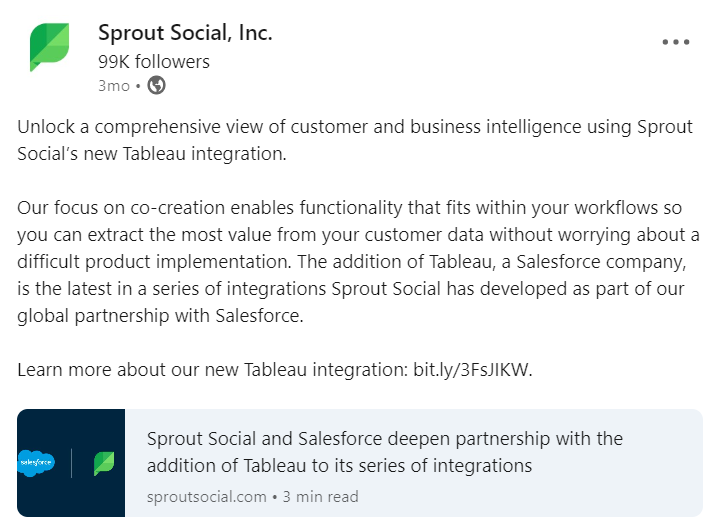
Social media articles in Sprout Social’s Insights blog which drives traffic to their website and more visibility when it comes to industry topics.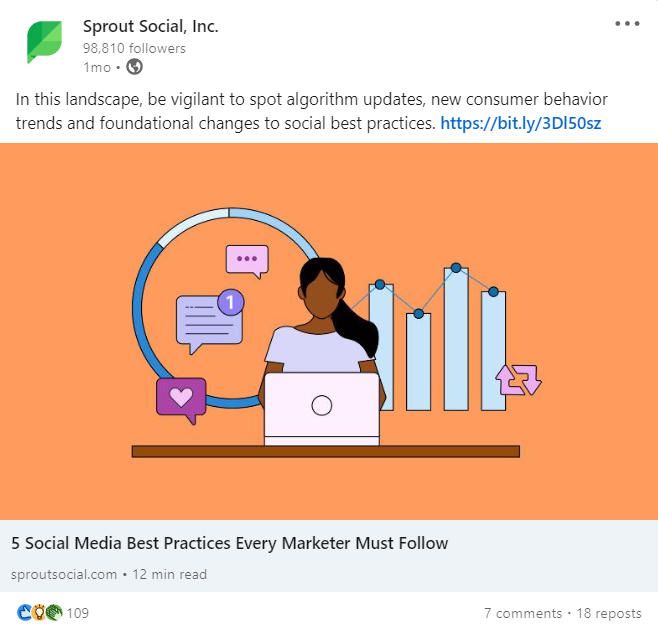
Find the types of social media content that work for your audience
Thanks to all these types of social media content, there are multiple ways for you to express your brand voice and make meaningful connections. And while best practices are a good starting point, your audience and brand are unique, so you need to find what works best for both.
Discover what type of content your brand should use on social media by taking our social media content mix quiz to find the ideal fit.
Source : https://sproutsocial.com/insights/types-of-social-media-content/
Auteur :
Date de Publication : 2023-03-07 09:00:00
Le droit d’auteur pour le contenu syndiqué appartient à la source liée.
GoogleAds
